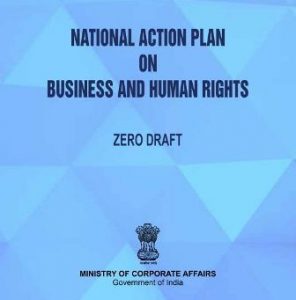The issues faced by India’s first NAP-BHR
India’s proposed National Action Plan on Business and Human Rights needs to be inclusive, transparent, and more mandatory than optional.
As India inches closer to its National Action Plan (NAP) on Business and Human Rights (BHR), civil society voices and human rights organizations are concerned about its impact. The zero draft of the NAP was released by the Ministry of Corporate Affairs in 2018. Post the release of the draft, several CSOs such as Partners in Change and Praxis came together to produce a report of recommendations to the draft. The final recommendations report was released in February 2021.
released by the Ministry of Corporate Affairs in 2018. Post the release of the draft, several CSOs such as Partners in Change and Praxis came together to produce a report of recommendations to the draft. The final recommendations report was released in February 2021.
The United Nations South Asia Forum on Business and Human Rights (UNSAF-BHR), on Wednesday, organized a seminar, which featured individuals from the UNDP India, Praxis, PiC, National Campaign on Dalit Human Rights, All India Drug Action Nework, and the Employers’ Federation of India, among many others.
The overarching theme of the seminar was to connect businesses with the principles of BHR, hold them accountable, and ensure that the upcoming policy is less optional and more mandatory. The seminar was aimed at identifying key human rights issues in the country, and the obstacles and drivers one may find moving forward. The upcoming decade has been labeled by the UN as ‘The decade of implementation of business and human rights.’
Also Read : Business and Human Rights: 10 Years of an Arduous Journey
Nusrat Khan, UNDP India, said that as part of the collective action to move forward, there will have to be an integration of global standards with Indian priorities, along with a push for policy coherence. She further recommended that through instances of sustainable procurement or responsible BHR practices by PSUs, the government should lead by example. “The government should periodically review the BHR policies of a company, while only doing business with those that show instances of human rights due diligence. They also recommended that governments should provide protection to human rights defenders and whistleblowers,” she said.
Speakers also stressed on the need to be inclusive in formulating the final policy, stressing that it should include voices from the corner most parts of the country, because they would be the ones being directly affected by it.
Bombay High Court advocate Lara Jesani, while commenting on the trivial environment of the country said, “India is recovering from an economic crisis and one of the biggest challenges we face is the regulatory breakdown taking place, along with every day instances of violence. A number of political reforms in the mining, environment, and labour sectors were brought in the pandemic without prior consultation with citizens.”
She further suggested that the BHR document should be based on the United Nations’ Guiding Principles (UNGP), respond to challenges specific to the Indian context, be inclusive & transparent in its formulating process, and be regularly reviewed. According to her, concerns of business violations that India faces today, and may continue to face after the BHR policy comes into practice, include a bypassing of public consultation and community consent, dilution of protective policies based on land, environment & natural resources, and ease of doing business at the cost of the vulnerable. It may also weaken the right to information, deteriorate the access to remedy, and worsen the situation of labour and civil society members.
“Today, there are attacks on human rights defenders and shrinkage of democratic spaces. We also saw the dilution of the Environmental Impact Assessment Notification 2006, along with a non implementation of the Forest Rights Act,” Jesani added.
Members of the panel recommended that the proposed NAP should be inclusive, guided by the voices of women, children, persons with disabilities, LGBTQ members, dalits, adivasis, minority communities, and those vulnerable to unethical BHR policies.
Discussing on the issue of supply chains, twentyfifty Director Rishi Sher Singh said that labour rights should be given a central focus. “The key obstacles of implementation of BHR policies in supply chains include lack of transparency, complaint mechanisms, safe spaces for workers to report abuses without consequences, and a heightened amount of inequality, poverty, and bonded labour.”
Also Read : The Story of Fishworkers Fight Showcases the Might of Masses in Democracy
He further suggested that to overcome these issues, there should be a clear tone from the government’s behalf, along with more effectiveness of laws.
“We should also focus on the condition of contractual workers, safety nets, and social protection of employees. Including workers’ voices, building accountability, strengthening worker unions, assuring access to justice and remedy, and lowering the power imbalance would also benefit the cause,” said Shahnaz Rafique, Project Director, South Asia IndustriALL.
Panellists also added that gender inequality (including gender based violence and gender gap in leadership & pay), caste based discrimination (dalits may lose their jobs due to non-implementation of reservation policies in public-private partnership), and absence of a grievance redressal mechanism would be important aspects to gauge at.
The NAP, which is likely to release in June 2021, will be India’s first ever hardened policy-stance on business and human rights. PiC Chief Executive Viraf Mehta added, “Since this is our first NAP, it will be a test of what is actually achievable. Drivers such as the financial sector, investor groups, human rights commissions, trade unions, and parliamentarians have to work in coordination to assure the implementation of the plan. We should also create a platform where we are able to talk directly to CEOs of big businesses and hold them accountable for unethical practices.”
